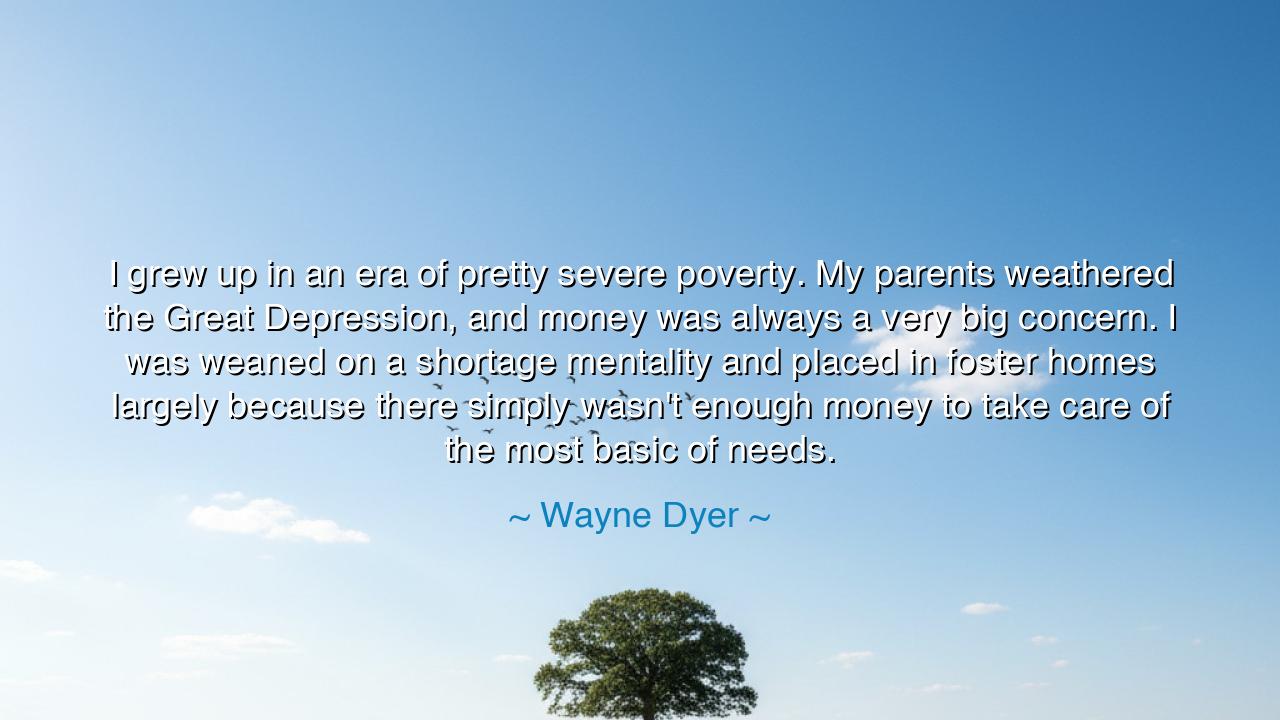
I grew up in an era of pretty severe poverty. My parents
I grew up in an era of pretty severe poverty. My parents weathered the Great Depression, and money was always a very big concern. I was weaned on a shortage mentality and placed in foster homes largely because there simply wasn't enough money to take care of the most basic of needs.






In the deeply human and reflective words of Wayne Dyer, we find a story that begins in hardship but blossoms into wisdom: “I grew up in an era of pretty severe poverty. My parents weathered the Great Depression, and money was always a very big concern. I was weaned on a shortage mentality and placed in foster homes largely because there simply wasn't enough money to take care of the most basic of needs.” These are not the words of complaint, but of remembrance—the testimony of a man who rose from scarcity to abundance, from fear to faith. They speak to the eternal struggle between deprivation and hope, and to the power of the human spirit to transform its beginnings into blessing.
The origin of this saying lies in the early life of Wayne Dyer, a man who would one day become known as a teacher of self-reliance and spiritual growth. Born in 1940, in the long shadow of the Great Depression, he was the child of a generation marked by hunger, unemployment, and despair. His father abandoned the family, leaving his mother to care for her children alone, and Dyer spent much of his youth in foster homes. Out of this crucible of lack, he learned two truths: first, that poverty of circumstance can wound the body; and second, that poverty of spirit can destroy the soul. The first, he endured. The second, he overcame.
The phrase “shortage mentality”—so central to Dyer’s teaching—refers to a state of mind forged by scarcity, where fear replaces faith, and one’s worth becomes tied to the weight of one’s possessions. Many who have lived through hardship carry this burden silently: even when abundance comes, they cannot rest, for the ghost of deprivation still whispers, “There is never enough.” Dyer’s journey was a pilgrimage out of that prison of thought. He saw that the mind shaped by want must be healed not by wealth, but by gratitude, generosity, and faith in life’s unseen providence. His words remind us that the greatest riches are those of the heart.
The ancients, too, knew this truth. In the days of Stoic philosophy, men like Epictetus, himself once a slave, taught that no man is truly poor who possesses contentment. “Wealth,” he said, “consists not in having great possessions, but in having few wants.” Like Dyer, he was forged in suffering and discovered that the path to freedom lay not in gold, but in the mastery of one’s own mind. The Stoics believed that adversity, when embraced with courage, becomes a teacher. So too did Dyer, who turned the wounds of his youth into lessons of compassion and empowerment for generations to come.
Consider also the story of Abraham Lincoln, born in a cabin of rough-hewn wood, raised amid poverty and loss. He, too, was “weaned on a shortage mentality,” and yet from that soil of hardship sprang a spirit vast enough to hold the weight of a nation at war with itself. Lincoln learned, as Dyer did, that deprivation need not define one’s destiny—it may, in fact, deepen one’s humanity. The one who has known lack understands the sacred worth of every small blessing. From the emptiness of his youth, Lincoln drew the empathy that made him the great reconciler of his age.
Thus, Dyer’s reflection is not merely a memory of hardship—it is a revelation of transformation. The boy who once feared there would never be enough became a man who taught others that abundance begins in the mind. His life is proof that our origins do not confine us; they refine us. To be raised in want is not to be cursed, but to be challenged—to learn the art of gratitude, to discover strength in simplicity, and to turn pain into purpose. Those who rise from scarcity learn the secret that abundance is not measured in possessions, but in perspective.
The lesson, then, is this: do not let the circumstances of your past imprison your spirit. If you were raised in want, use that memory to cultivate compassion, not fear. If you were taught to believe there is never enough, awaken to the truth that life is infinite in its giving when the heart is open. Practice generosity even in small things—a smile, a word, a kindness—so that you may live from abundance rather than from lack. The shortest path from poverty to peace is the practice of gratitude.
So, my listener, remember this wisdom of Wayne Dyer: though the body may be raised in scarcity, the soul can choose abundance. The storms of your youth may have shaped you, but they do not define you. Build, therefore, a new inheritance—of courage, compassion, and faith—and pass it on to those who come after. For true wealth lies not in what you own, but in what you become; and the one who learns to see sufficiency in every breath has already found the treasure that poverty can never take away.






AAdministratorAdministrator
Welcome, honored guests. Please leave a comment, we will respond soon